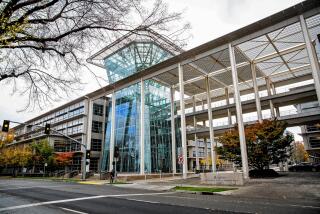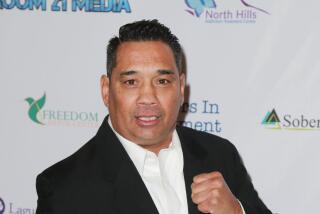CalPERS to seek legislation to bar gifts to public employees
Shaken by a report alleging wrongdoing by former top officials, directors of the California Public Employees’ Retirement System voted to push for legislation curtailing gift-giving to public employees and limiting board members and executives from going to work for companies doing business with the pension fund.
“Misconduct and serious ethical breaches have no place at CalPERS,” Anne Stausboll, chief executive of nation’s largest public pension fund, said at a board of directors meeting Tuesday.
Stausboll pointed out that the board already has instituted many of the proposals the report suggested to strengthen ethics and discipline and to make its operations more transparent to the public.
But the wrongdoing alleged in the report “is far more grievous than anyone knows,” said Robert Fellmeth, executive director of the University of San Diego’s Center for Public Interest Law.
That’s because the misuse of money at a giant pension fund costs all Californians, Fellmeth said, especially future generations of taxpayers who will be holding the bag if state retirement systems can’t meet their financial obligations.
CalPERS should avoid future conflicts of interest by prohibiting all gift-giving to public officials, he said.
The report, released Monday after a 17-month review, accused former CalPERS Chief Executive Federico Buenrostro Jr. of pressuring subordinates to invest billions of dollars of pension money with politically connected firms.
It alleged that Buenrostro, who served for six years through mid-2008, falsified 11 documents to make it appear as if the CalPERS board was aware of investment details that had not in fact been disclosed to the board.
The report also said that Buenrostro and other former board members strong-armed a benefits firm to pay more than $4 million in fees to consultant Alfred J.R. Villalobos, a onetime Los Angeles deputy mayor and former CalPERS board member.
State and federal criminal and civil enforcement investigations are pending, according to the report prepared for CalPERS by the Washington law firm Steptoe & Johnson. The report did not divulge many details, it said, because criminal authorities had asked the law firm to keep that information private.
“We believe there is more to come,” Philip S. Khinda, who headed the law firm’s investigation, said at the board meeting. “It’s time for law enforcement to do what it sees fit to do.”
He said that some types of fraud, such as Buenrostro’s alleged falsification of documents, carry a five-year prison sentence for each count in a conviction.
The scandal has left “an ugly stain on this organization, and it will take a hard scrubbing to remove the blood,” said Grant Boyken, representing state Treasurer Bill Lockyer on the board. “If actors are found to have committed criminal acts, they should be prosecuted and put behind bars.”
But some CalPERS executives appeared eager to put the deeds behind them. Board President Rob Feckner, reading a statement, condemned “in the strongest way possible” the alleged wrongdoing. Running CalPERS, he said, is “a sacred trust that never should be compromised.”
After the session ended, Feckner, citing ongoing criminal investigations, declined to discuss the matter further and left.
The pension fund, with $228 billion in assets, has been rocked by investment losses during the recession and sent reeling by allegations that it was too cozy with outside investment firms.
Critics charged that it sat by and allowed go-betweens to collect exorbitant fees simply for referring deals to many of Wall Street’s most powerful private equity, hedge fund and real estate investment managers.
Monday’s report laid out the details, recounting, for instance, how Villalobos plied his old friend Buenrostro and others with an around-the-world trip, a Lake Tahoe condominium and other gifts.
At the same time, the report said, Villalobos reaped more than $50 million in commissions from Apollo Global Management in New York, Aurora Capital Group in Los Angeles and other investment firms for helping to direct CalPERS business to them.
The findings of insider dealings came amid widening attacks on public employee pension funds in California and other states that no longer can afford hefty pension contributions. The findings also provide fodder for California Republicans to prod Democratic Gov. Jerry Brown to ditch the pensions in favor of 401(k)-style retirement accounts.
Separately, in a surprise move at Tuesday’s meeting, a CalPERS committee voted unanimously to drop an effort to lower its estimate of future earnings, which would have cost the state government an additional $200 million in July to cover investment shortfalls.
CalPERS already was getting about $400 million more this year in contributions from the state. Employer contribution rates for local governments had been expected to increase in July by as much as $1 billion, but Tuesday’s vote stopped that hike as well.
Responding to pleas from cash-strapped state and local governments, the benefits committee decided Tuesday to continue using an assumed annual rate of return of 7.75% from the fund’s investments.
In January, CalPERS said that its total investments grew 12.5% in 2010.
A CalPERS’ actuary had recommended lowering the annual assumption to 7.5% but said the higher number was still “prudent.”
Such a decrease in the assumed rate of return would cost “our retirement system overnight $2 million,” a Huntington Beach city official told CalPERS.
“This is not the time, speaking for local governments, to put this kind of adverse change,” said board member Tony Oliveira, a former Kings County supervisor. “I have not met one [local official] that thought we should drop the discount rate.”
In the fiscal year ending June 30, the state is contributing $3.6 billion to the CalPERS fund, while school districts are adding $1 billion.
Critics, supported by a recent study by Stanford University, said that CalPERS uses overly optimistic assumptions on annual gains.
Investment income accounts for about three-quarters of the money CalPERS needs to meet its ongoing obligations to provide benefits to 1.3 million government employees, retirees and their families, the system said.







